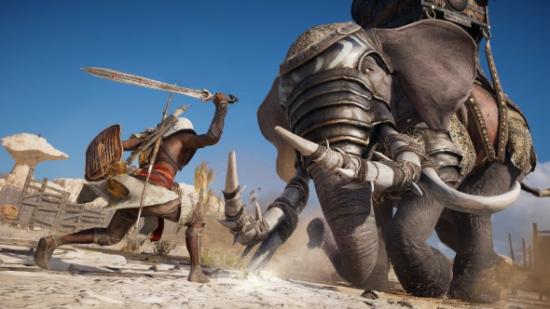After playing nine Assassin’s Creed games, I felt confident that I knew what Ubisoft’s series of hooded stab-a-thons are all about. They are games about leaping stealth attacks, collecting icons, and climbing really tall buildings. But after playing four hours of Assassin’s Creed Origins, I find myself surprised to discover that I apparently did not know what the sacred building blocks of this series actually are. When Ubisoft Montreal promised to reinvent the series with Origins I was not expecting them to build The Witcher: Egypt Adventure. Yet here we are.
Want to know what skills Bayek can learn? Read our Assassin’s Creed Origins abilities guide.
Ubisoft are downplaying the roleplaying elements of the game by referring to them as the “RPG layer,” but make no mistake: Origins is an RPG. It has XP and levelling so that progression is governed by a plethora of always-improving weapons, crafted upgrades, and unlocked abilities. The narrative is delivered through a variety of concurrent, free-form quests. In fact the whole world is constructed in a manner that will be familiar to anyone who has played a fantasy epic. But there’s one in particular that it resembles.
Of all the RPGs out there, The Witcher 3 is the one Origins shares the most common ground with. Not due to the quality of writing, lore, and quest design (sorry Ubi, you’re not quite CD Projekt Red yet) but because of its defined central protagonist, attention to world detail, and robust stats-based mechanics.
Intrigued? These are the five elements that I feel show how Assassin’s Creed has eagle dived over the genre fence.
A living world that’s more than just historically accurate

I have a real soft spot for Assassin’s Creed Syndicate’s meticulous re-creation of Victorian London, but I won’t deny that it has a problem: it is essentially a period-accurate Google Street View. This isn’t an issue exclusive to Syndicate either, as all of the Assassin’s Creed games’ worlds feel hollow. They’re beautiful and intricately designed but can’t shake the fact that they’re essentially jungle gyms for hooded hitmen to clamber over. Origin’s Egypt, on the other hand, feels significantly more alive.
Much of this comes from the sheer variety of its sandy landscapes and urban centres. Because Origins replicates /all/ of Ancient Egypt – not on a 1:1 scale, but in terms of every type of scenery the country had to offer – there are a multitude of different biomes to discover. My hands-on demo drops me in an area as far from the sprawling city of Alexandria as possible, and it really changes the manner in which I play. Out here, there are few buildings – just huts and market stalls – and an hour in I realise I have not climbed a single tower. The swift moves of parkour still exist, absolutely, but the desert and Nile delta areas I’m exploring do not demand it. Instead, as I trot through the streets of the sun-drenched village on horseback – the desert and pyramids in my sights – I am reminded of times riding Roach through The Witcher’s rural regions. And that is only where such parallels begin.
Ubisoft have cleaned up Assassin’s Creed’s world map. There is barely an icon on it, signalling that collectables have been all but scrapped. Instead, there are a few question marks dotted about; invitations for you to explore and discover secrets. Arrive there and you may find a hippo habitat, a fortress to infiltrate, or perhaps some form of treasure to pilfer. And without a minimap, finding these landmarks is not merely a case of tracking a blip on a radar. You have to spend time soaking in the world, exploring through the use of both Bayek and his eagle Senu. The difference is immediately obvious. Despite only playing for four hours, I already feel like I know these areas of Egypt better than any part of any previous Assassin’s Creed world. I’m invested in the locations, something I can say about The Witcher and Dragon Age, but never Assassin’s Creed. My conclusion: death to all minimaps.
Quests for pharaohs and fishermen
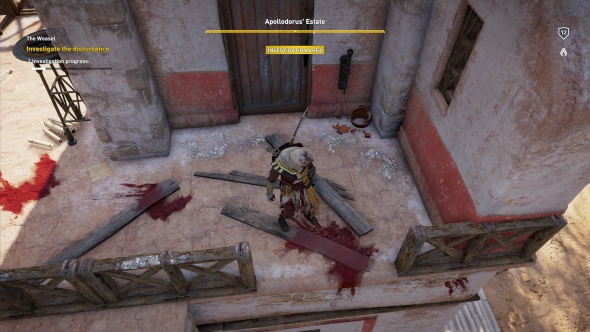 A handful of diamond icons populate the map, denoting quest givers. Rather than playing the game sequentially, mission by mission, you now have a journal akin to every other RPG you’ve played. It really changes the way an Assassin’s Creed world feels when you can have multiple quests active simultaneously. Should your progress be halted by a particularly tricky infiltration you can simply go and do something else. If, on your way to a quest marker, you encounter another target, you can tackle them before moving on. You may even pass by a gang of ruffians that later turn out to be a quest objective, which helps to make the world feel persistent.
A handful of diamond icons populate the map, denoting quest givers. Rather than playing the game sequentially, mission by mission, you now have a journal akin to every other RPG you’ve played. It really changes the way an Assassin’s Creed world feels when you can have multiple quests active simultaneously. Should your progress be halted by a particularly tricky infiltration you can simply go and do something else. If, on your way to a quest marker, you encounter another target, you can tackle them before moving on. You may even pass by a gang of ruffians that later turn out to be a quest objective, which helps to make the world feel persistent.
The change to an RPG quest structure has brought with it both the advantages and bloat that comes with the genre. On the plus side, it means an Assassin’s Creed game with a strong variety of mission types. An early quest I play involves doing detective work: analysing clues on a blood-soaked tower in order to work out what happened to the man who plunged from its balcony. Later, I am all-out-brawling with a miniboss, while the next quest sees me returning to the game’s stealth roots to rescue a child. Less enticing are the fetch quests for generic NPCs – the most tired of RPG tropes – hence I ignore the task of finding crocodile, vulture, and hyena bits during my hands-on time. I imagine that won’t be the last of that quest type we see in the full game. They feel less pointless than collecting 100 feathers/flags/fragments, as per every other Assassin’s Creed games, but they’re easily the new weak link in the chain.
Focused roles and multi-class skill trees
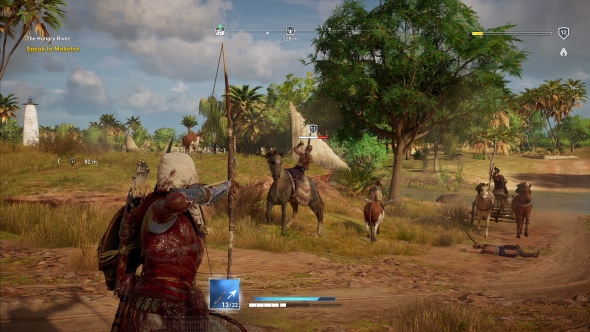 Origins features an expansive, entwined abilities tree constructed of three branches: Warrior, Hunter, and Seer. It initially looks like a standard set of upgrades, but after a while it becomes clear what Ubisoft are offering: classes. Rather than rolling warrior, ranger, or rogue at the start of the game though, Origins allows you to focus or multi-class your playthrough.
Origins features an expansive, entwined abilities tree constructed of three branches: Warrior, Hunter, and Seer. It initially looks like a standard set of upgrades, but after a while it becomes clear what Ubisoft are offering: classes. Rather than rolling warrior, ranger, or rogue at the start of the game though, Origins allows you to focus or multi-class your playthrough.
For Assassin’s Creed purists, the obvious path here is a stealthy rogue. Abilities like Eagle Tagging (selecting enemies allows you to see them through walls), Hunter’s Instinct (observe the path an enemy is taking), and Sleep Darts are the winning choices for that, as well as the hidden blade. The latter is, as you may already be aware, Origins’ biggest point of controversy, since stealth attacks are no longer one-hit kills. Except when they are.
The switch from sneaky sandbox to open-world RPG is most evident in the series’ iconic weapon. It now has a base damage stat that’s enough to outright kill anyone of your level, but more powerful foes will escape with HP to spare. Upgrade the hidden blade with crafting materials, though, and you can enhance it to the levels of guaranteed lethality that you know and love. It sounds bizarre and unwanted in the context of classic Creed gameplay, but look at it through an RPG lens and it soon makes sense. When has a low-level rogue in a fantasy game ever achieved an insta-kill?
The shift to roleplaying archetypes also means we finally get true ranged combat, with bow and arrows joining the assassin toolset. I find a combination of stealth and marksmanship to be the most satisfying approach, and that’s largely down to how well the bows have been integrated into combat. There are a multitude of bow designs, but two stand proudest: the Predator and Warrior. The former functions as a perfect sniper weapon and can be enhanced with a delightfully absurd ability that allows you to control the arrow’s flight path. The Warrior, in direct opposition, is a short-range bow notched with five arrows; basically a pre-gunpowder shotgun. There is a genuine childlike thrill that comes with turning a boss into a pincushion.
That leaves us with the classic Warrior class, which is where much of Ubisoft Montreal’s efforts have clearly been placed. While the stealth path is still viable, Origins is very much a game that can be played and ultimately enjoyed as an outright brawler. Thankfully, that means both the end of the series’ to-me-to-you combat, and the elimination of the nagging feeling that a brash approach is the ‘wrong’ way to play.
Combat to engage the darkest souls
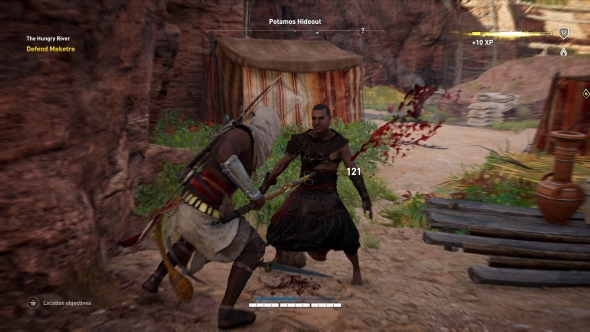
The Bayek build I’m using for the hands-on demo has several Warrior abilities unlocked, and effects like adrenaline-fuelled super moves are the first indication that battle in Origins doesn’t abide by tradition. This is emphasised as a miniboss heaves a mace over his head and shatters my skull for the fourth time in a row. Any muscle memory is rendered useless; holding the block button is no more a solution than smearing cake on the monitor is.
It appears Ubisoft have been paying attention to the way Dark Souls has captured gaming culture, since Origins’ combat requires your fullest attention. It’s not as punishing as FromSoftware’s flagship fencing, but demands significantly more from players than any previous game in the series. A ballet of dodges, perfectly-timed parries, forward thrusts, and quick weapon switches comprise this new system. Getting used to it takes me the best part of an hour, but my patience is rewarded with teeth-clenchingly bloody finishing moves. Plus the ability to actually complete the quest, of course.
It is with each of Bayek’s sword flourishes that I see The Witcher reflected in Origins’ steel. While Assassin’s Creed makes no attempt to replicate the depth of lore, quality of conversation, and branching storylines of those games, echoes of the action elements of Geralt’s adventures can be felt. Both games feature a defined central fighter whose approach is customised by player choices. While they don’t share identical mechanics, there is clearly a shared action RPG philosophy; combat is a challenge that must be mastered. Each step must be considered, each blow perfectly timed. For once, Assassin’s Creed’s combat can genuinely be considered exhilarating.
An inventory of blues, purples, and golds
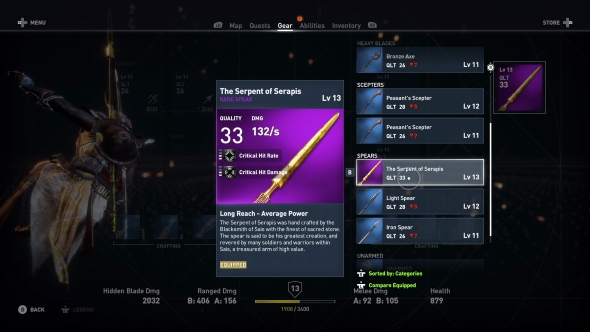
The most important change of all when it comes to the new combat is weapon variety. No longer are we acting out the scene from Suicide Squad where the Joker rolls around in his collection of knives – Bayek has access to a truly expansive armoury. Alongside the regular staples of short and long swords are maces, spears, twin blades, and axes, all of which function with distinct, unique patterns. Spears, for instance, can be swung in a wide sweeping motion to damage a multitude of foes, or thrust forward to skewer someone to the wall.
The most interesting thing about this weapon variety is the way the inventory allows you to quickly switch between them. Two weapons can be equipped at any one time while a single button tap will swap between them. This introduces a layer of gear management, and opens up tactics such as holding back beefy opponents with the range of a spear, before swapping to double daggers and quickly closing in for a violent conclusion. Need to add some arrows into the mix? Bows get their own quick button, allowing you to fluidly swap between three methods of murder.
Further showing its RPG credentials, all weapons in the game come with rarity grades (denoted by blue, purple, and gold colouring), with legendary items possessing special perks. And, of course, all items have associated stats. You know the drill: the bigger the number, the better the loot.
This is a Ubisoft spin on the genre though, and you can see this through the elements that have been lifted from the publisher’s other games. In this instance it is Far Cry’s crafting. Like the slaughter-obsessed shooter, hunting and foraging is a large part of Origins, which means you’ll be required to harvest the pelts and hides of a variety of wildlife in order to improve Bayek’s six persistent gear items. These include the hidden blade, quiver, and breastplate, with each having ten tiers of improvement. Upgrade these and core base stats such as Bayek’s overall health, damage potential, and carry capacity will be improved.
It’s easy to dismiss Origins as more of the same Assassin’s Creed when looking at screenshots and trailers, but my extended time with it has revealed that it really is evolving the way the series’ template works. The core components are still there – there is plenty of climbing and stabbing to keep purists happy – but, like Black Flag’s shift to the open seas, this colossal RPG reimagining is the refresh the series needs. And while it may not be The Witcher’s equal, it’s great to Ubisoft take such a bold step in creating an game closer to that mould. Based on what I’ve seen, Assassin’s Creed could well be about to celebrate its tenth anniversary with its strongest title yet.
